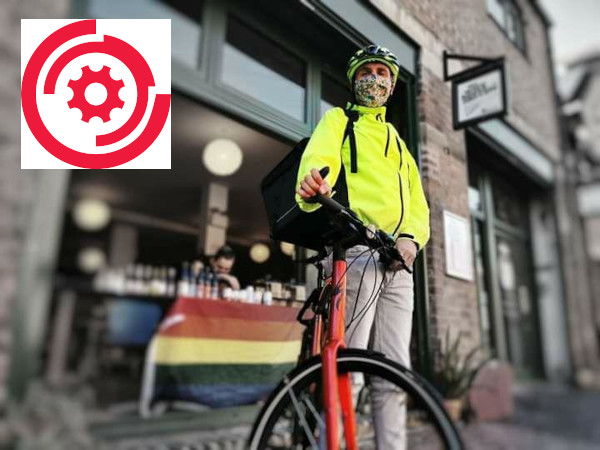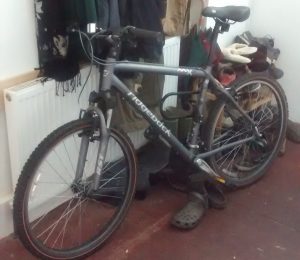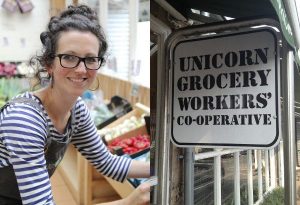CoopCycle Federation: aiming for a bicycle courier co-op in every town

Today I’m talking with Claire Stocks of Chorlton Bike Deliveries and Matt Nicholson of York Collective. Both are bicycle courier co-operatives.
At Lowimpact we’re interested in helping to build a sustainable, democratic economy and strong communities. Your work covers all those things. So I want to know why you do what you do, how you started and how it’s going?
Claire: We’re in Chorlton in South Manchester. We got going in April this year. It sprang out of the mutual aid response to covid. We wanted to help people who were shielding, lots of groups were forming, and I was involved in trying to help connect things. A few like minds came together, and we decided to provide a bike delivery service to people who were shielding. We have lots of independent shops in Chorlton. The Unicorn co-operative supermarket is in our area.
We interviewed Debbie from Unicorn a while ago.
Claire: People like Chorlton because it’s got this independent vibe. A lot of us were involved in the climate movement in various ways, and felt that all this could combine – we could help people who couldn’t get out of the house, build the local community, support local traders and help to reduce car journeys and van deliveries. We started just over 6 months ago and since then we’ve developed relationships with a dozen key local traders, who we deliver shopping for. But we also have a strong community arm, so we support food banks and other community groups. We’re a volunteer-based organisation with 20 riders. No-one rides full-time. But we can see that there’s a demand, and so we want to be able to employ local people to deliver, but with a living wage and better conditions than Deliveroo and others. So we’re looking at our future, incorporating as a co-op and developing a business plan for 2021 that will set out our pathway to becoming a viable concern, and taking fossil fuel vehicles off the road.
Matt: We got in contact with CoopCycle a couple of years ago.
Tell us what CoopCycle is.
Matt: CoopCycle is the federation of bicycle courier co-operatives who are creating the software and governing structure behind a hub around which these courier coops revolve. I was riding for one of the other food delivery platforms. I have a background in geospatial work. I was on the Cotech forum at the time. I heard about CoopCycle, got in touch, spoke with some friends who were also couriers. The software was in its infancy, and very Europe-centric. So we helped develop the software for use in the UK. We also talked to local businesses. In York there’s an association called Indie York – an association of a couple of hundred local traders. We got going properly at the end of last year, delivering for a social enterprise that has now gone. Covid struck, and the lockdown, and we did deliveries for the Supper Collective, a group of restaurants who got together to provide meals for local residents and the NHS.
How are you doing? Are you paying wages?
Matt: We’re paying pro rata – for the jobs being done.
Do you both go out and deliver yourselves?
Matt: Yes, there are four of us, and we’re all out delivering.
Claire: We have 20 people, and we do differing amounts. I only do about one a week, as I’ve got other projects I’m working on. It’s very flexible. We didn’t have a business plan – it was an emergency response idea. Central to our ethos is that we belong to a collective with values around building a better community. The volunteer aspect has really worked. We’re now developing a platform, and we’re also members of the CycleCoop federation. That’s been fantastic. They really helped us get going and broadened our horizons. One of our volunteers has been working on their software too.
I’d like to know a bit more about the federation. Is it European or global?
Matt: It’s international now. There are a couple of co-ops in Canada and the US. There’s interest in South America, and it’s all over Europe.
Claire: It was started by a couple of people who used to work for one of the big delivery platforms. They wanted to build an ethical alternative. It’s a co-op, decisions are taken by the members.
Matt: It’s grown rapidly. They have 20 or 30 volunteers who do work around governance, licensing and other issues.
Claire: It’s free to join and you get access to the platform, which you can help to develop. Over time, the platform will have to develop an income stream. But at the moment, if anyone wants to start a cycle courier co-op in their community, linking up with them is a great idea – there’s a lot of support and knowledge there.
When I interviewed Debbie from Unicorn Grocery, she told me that they’d like to help other co-operative grocery stores to start, so they’ve developed a toolkit – a step-by-step guide – to help people do exactly that. Does the federation have something like that?
Matt: That’s currently being worked on. We’re at the point now where we have enough knowledge locally within each country, where something universal could be made that’s adaptable for each country. Legal business forms are different in each country.
What kind of barriers do you face, and how can people help?
Matt: In the UK, we’re privileged to have the co-operative community that we have. There’s a lot of support out there. In the UK we just need to get more members and spread the word. All the software is open source, so we could do with some help there too. Expertise of local laws across Europe would be helpful too.
Are you looking for volunteers in York, or are you talking about the federation?
Matt: The federation, yes.
Claire: I’d like to add that it seems to me that there are 3 kinds of ways that cycle deliveries can happen. One is logistics operations – delivering business to business by van. Let’s switch that to electric vans or cargo bikes. There’s a company doing that called Zedify. They have a big contract with the NHS. Second, there seems to be growth in online platforms thinking of ways to promote more local retail – like Shocal, and I think there’s one in Bath called GoodSixty. Their mission seems to be to help local traders get their goods to customers. GoodSixty have teamed up with a cargo bike delivery service. Third – community schemes like ours and Matt’s. There’s another in Calderdale. It’s hard for them to offer something without an online platform, which is where the federation comes in. Any co-op can have a platform with them. Orders can be booked and the deliverer gets a notification. You can create a home on the federation platform. Having said that, we are going to create our own website. I think these are the three models for bike couriers.
What there isn’t for grassroots groups is an easy way to get commercial contracts. Local authorities and NHS move stuff millions of miles per year, but they procure that with big companies in multi-million pound deals. For community groups, it’s hard to tender, so we’re in discussion with a part of the NHS about the possibility of moving stuff between NHS bases in Manchester. It would take a lot of vans off the road. But they’ve never done it like that before, so that’s a barrier. Plus another barrier is that at the moment, the way deliveries work is that a product will be put in a van and delivered straight to your door. We’re hoping to see more distribution centres on the edge of urban areas. Then bike couriers can bid to deliver the last mile. But that infrastructure isn’t in place yet. The government might be interested because delivery vans account for around 15% of vehicles on the road now.
Do you know about CLES? They’re in Manchester. They help local authorities move towards the Preston Model – where they give contracts particularly to small, local businesses. It’s based on anchor institutions (so called because they’re not going anywhere) like hospitals, schools or council buildings, and they also help set up co-operatives. So I think you’d be able to have an interesting conversation with someone at CLES.
Claire: Thank you, yes.
It’s a no-brainer isn’t it? It’s good for health, the environment, for local business, for community.
Matt: I’d echo that. To have better communication within the co-operative community would be great.
We’re very interested in networking, and bringing new economy people together, to become each other’s customers for example. Can I keep you both in the loop about that kind of stuff?
Matt: Definitely.
Are either of you looking for volunteers yourselves?
Claire: People locally often get in touch with us. Our door is open for volunteers. I don’t think it would be relevant for people who don’t live in our area though. So if you live in south Manchester, do get in touch. We’ve also worked with a group in a neighbouring borough – Trafford – who are setting up a scheme, so if you’re interested in helping with that, do get in touch.
Matt: We’re looking for new members, rather than volunteers. It will probably involve sweat equity.
Do you know how many cycle courier co-ops there are around the UK?
Matt: In the federation, I think there are 5. But there are formative groups, and lots of interest.
I can see every town having one.
Claire: Some places, like Bath, Bristol, I think Glasgow. Pedal Me in London is another model. They raised a million pounds to launch in London, for direct customer deliveries, on demand. London has the density of population and commercial demand that sustains that. I imagine Pedal Me have plans to launch in other cities. They’re not a co-op though. It’s a money-making model.
I hope co-ops are money-making as well though.
Claire: Good point.
Anything else you’d like to round off with?
Matt: The development of the federation software depends on new people and new ideas. So do get involved if you can.
Claire: What I’ve found is that this has been a brilliant way to show that deliveries can be done differently – by bike and by co-ops. I’m passionate about a shift from cars to walking and bikes. It’s a great, very visible way of stimulating conversations about bikes, co-ops, community, local businesses etc. It’s practical, rather than theoretical. The other thing is that we just did it, because it was an emergency. We didn’t wait until we had money or a detailed plan.
Thank you very much, guys. I hope this helps get you more customers and helps get more people involved in bike courier co-ops.
Highlights
- CoopCycle is the federation of bicycle courier co-operatives who are creating the software and governing structure behind the a hub around which these courier coops revolve.
- It was started by a couple of people who used to work for one of the big delivery platforms. They wanted to build an ethical alternative. It’s a co-op, decisions are taken by the members.
- It’s free to join and you get access to the platform, which you can help to develop. Over time, the platform will have to develop an income stream. But at the moment, if anyone wants to start a cycle courier co-op in their community, linking up with them is a great idea – there’s a lot of support and knowledge there.
The views expressed in our blog are those of the author and not necessarily lowimpact.org's




 Low-impact & the city 14: getting back on a bike after ten years
Low-impact & the city 14: getting back on a bike after ten years
 What it’s like to work in a cooperative grocery store: Debbie Clarke of Unicorn Grocery, Part 1
What it’s like to work in a cooperative grocery store: Debbie Clarke of Unicorn Grocery, Part 1
 ‘The Case for Community Wealth Building’: review
‘The Case for Community Wealth Building’: review
 The transport challenge – beyond electric cars
The transport challenge – beyond electric cars
 Co-operatives
Co-operatives
 Community
Community
 Cycling
Cycling
 Commons economy
Commons economy


